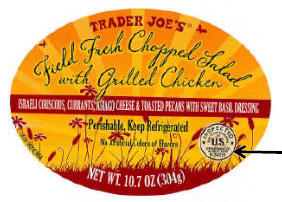2013 E. coli Outbreak Linked to Ready-to-Eat Salads – Recall and Advice
Multistate Outbreak of Shiga toxin-producing Escherichia coli O157:H7 Infections Linked to Ready-to-Eat Salads (Final Update)
Posted December 11, 2013 3:00 PM ET
This particular outbreak appears to be over. However, E. coli is still an important cause of human illness in the United States. More information about E. coli, and steps people can take to reduce their risk of infection, can be found on the CDC E. coli Web Page.
Recall
On November 10, 2013, Glass Onion Catering, a Richmond, California firm, voluntarily recalled approximately 181,620 pounds of ready-to-eat salads and sandwich wrap products with fully cooked chicken and ham that may be contaminated with STEC O157:H7. The products were produced between September 23, 2013 and November 6, 2013 and shipped to distribution centers intended for retail sale in Arizona, California, Nevada, New Mexico, Oregon, Texas, Utah and Washington. These products are regulated by FSIS. Products regulated by FSIS bear the establishment number “P-34221” inside the USDA mark of inspection.

In a related recall announcement on November 10, 2013, Glass Onion Catering recalledExternal Web Site Icon additional ready-to-eat salads and wraps. These products are regulated by FDA. These products have “Best By” dates of September 23, 2013 through November 14, 2013.
Media and consumers with questions regarding the recalls can contact Tom Atherstone, company president, at (510) 236-8905.
CDC, FSIS, and FDA recommend that consumers do not eat these products and dispose of them immediately.
Advice to Consumers and Retailers
Although the “Best By” dates have passed for the recalled products, consumers should still check their homes and refrigerators for any of the ready-to-eat salad products and wraps.
CDC recommends the following to consumers and retailers:
- Consumers should not eat the recalled ready-to-eat salad products and wraps and should dispose of any remaining product in their homes.
- This is especially important for children 5 years of age and younger, older adults, and people with weakened immune systems, who are at greater risk for complications (e.g., hemolytic uremic syndrome, a type of kidney failure) associated with STEC infections.
- Retailers and food service operators should not sell or serve the recalled ready-to-eat salad products and wraps.
- People who have eaten a recalled ready-to-eat salad product or wrap should look for signs of STEC infection: ◦People usually get sick from STEC 2-8 days (average of 3-4 days) after swallowing the organism (germ).
- Most people infected with STEC develop diarrhea (often bloody) and abdominal cramps.
- People who think they might have become ill from eating a recalled salad or wrap should talk to their health care providers.
Consumers with food safety questions can “Ask Karen,” the FSIS virtual representative available 24/7 at AskKaren.gov or via smartphone at m.askkaren.gov. The toll-free USDA Meat and Poultry Hotline 1-888-MPHotline (1-888-674-6854) is available in English and Spanish and can be reached from 10 a.m. to 4 p.m. (Eastern Time) Monday through Friday. Recorded food safety messages are available 24 hours a day.